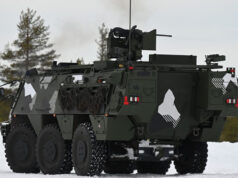According to the government, the Ministry of Defence aims to prioritise UK-based firms and strengthen supply chains.
The UK government has announced a new Defence Industrial Strategy aimed at bolstering economic growth, creating jobs, and strengthening national security. Defence Secretary John Healey introduced the initiative at a London Defence Conference, highlighting its focus on supporting UK-based defence firms and fostering innovation across the sector.
“Our defence sector should be an engine for jobs and growth, strengthening our security and economy,” Healey said, according to a Government press release.
The Defence Industrial Strategy seeks to address what the Government describes as inefficiencies in the sector, such as skills shortages and fragmented supply chains. It sets an ambition to increase defence sector employment in all parts of the UK and to improve the resilience of critical supply chains, including semiconductors and steel.
According to the Ministry of Defence (MOD), the strategy is intended to make the UK defence industry an integral part of the national economy, supporting long-term growth and stability.
The initiative also aims to position the UK to adapt to increasing global threats. “National security is the foundation for national stability and growth,” Healey said in his speech.
Key Investments
The announcement coincides with several major investments from private defence companies, according to the Government:
- Helsing, a European defence AI company, has committed £350 million over five years to develop and mass-produce AI-enabled drones in the UK.
- BAE Systems plans to recruit thousands of workers and expand its skills training initiatives.
- Babcock intends to create 1,500 graduate and apprenticeship opportunities in the coming year.
- Rolls-Royce has opened a new office in Glasgow, expected to generate 120 jobs to support submarine programmes.
The strategy also seeks to tackle long-standing issues. The Government has acknowledged inefficiencies in defence spending and export strategies, noting that previous approaches have limited growth.
Kevin Craven, CEO of ADS Group, which represents aerospace, defence, and security industries, expressed optimism about the Government’s focus on defence as a driver of economic growth.
“The Government underlining the importance of the defence sector to the UK economy is hugely welcomed,” he said. “To deliver the right capability to support the UK’s ability to deter, it is pivotal that we continue to contribute to military planning activities.”
The MOD also plans to run a “wargame” to explore how the industry could sustain supply chains during wartime conditions.
According to the Government, the new strategy will align with the forthcoming Strategic Defence Review and reflect lessons from recent global events, such as the war in Ukraine. The Defence Industrial Strategy replaces the 2021 version, which was developed prior to Russia’s full-scale invasion of Ukraine.
The Government has committed to spending 2.5% of GDP on defence and claims this approach will create a more integrated and resilient sector.
Future Plans
The Government aims to release the full Defence Industrial Strategy by mid-2025. It has framed the initiative as part of its broader growth mission, which includes creating jobs and improving productivity across the UK.
Healey concluded: “We will mobilise the private sector to help face down global threats, direct more public investment to British businesses, and create jobs and growth in every nation and region of the UK.”
At the UK Defence Journal, we aim to deliver accurate and timely news on defence matters. We rely on the support of readers like you to maintain our independence and high-quality journalism. Please consider making a one-off donation to help us continue our work. Click here to donate. Thank you for your support!













The Turkish company Nurol Makina has also opened up a new production facility at Tachbrook Park, Leamington Spa
with 150 new jobs over 3 years
With vehicles like the NMS-L 4×4 armored vehicle
Presumably they’re hoping for a big British Army contract in that space at some stage??
Is that it? What about our land and air defence?
It’s not just the stuff that goes bang.💥
We should be bringing back in country a lot more manufacturing capabilities for the CSS side of defence.
A Finex steelmaking plant for the UK would be good. As would cheap, reliable electricity for UK manufacturing.